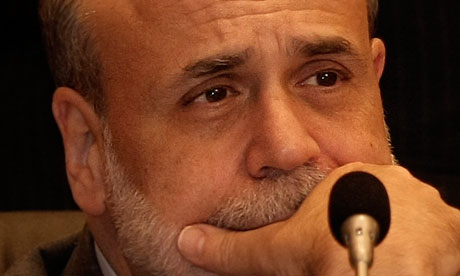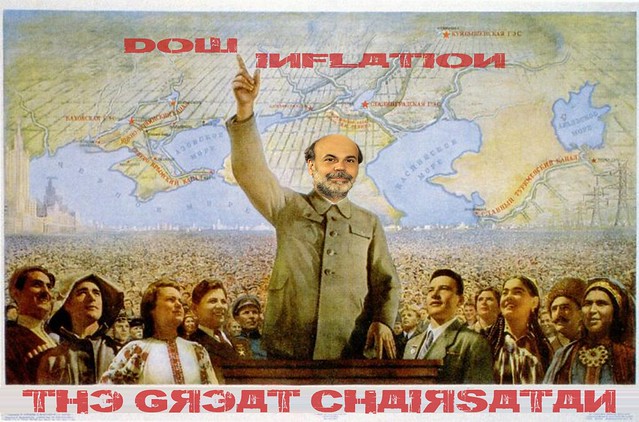Showing posts with label Federal Reserve. Show all posts
Showing posts with label Federal Reserve. Show all posts
Friday, August 10, 2012
HARRY REID IN 1995 ABOUT AUDITING THE FED, SOUNDING LIKE RON PAUL
the House voted 327-8 to pass Ron Paul’s “Audit the Fed” bill. But the legislation is dead on arrival in the Senate, thanks to Senate Majority Leader Harry Reid who has vowed not to allow the Senate to vote on it. But it wasn’t always this way with Reid.
Reid championed the legislation, according to watchdog govtrack.us.
In the video of the 1995 speech, Business Insider writes, Reid sounds a lot like Paul:
“I have sponsored legislation every year that would call for an audit of the Federal Reserve system. I offer that amendment every year, every year it gets nowhere,” Reid says. “I think it would be interesting to know about the Federal Reserve. I think we should audit the Federal Reserve — it‘s taxpayer’s money that’s being used there. But we don’t do that.”
“People just don’t care about the Federal Reserve. Maybe it‘s because it’s a subject that’s not very interesting — it’s not pornography, it’s not murder, it’s not an issue that deals with the Wild West.”
Monday, August 8, 2011
Alan Greenspan on US Downgrade: No Problem, "We can always print money"
via CNBC
"The United States can pay any debt it has because we can always print money to do that. So there is zero probability of default" said Greenspan on NBC's Meet the Press"What I think the S&P thing did was to hit a nerve that there's something basically bad going on, and it's hit the self-esteem of the United States, the psyche" said Greenspan
Wednesday, July 27, 2011
A Historical Perspective of Usury
"For the love of money is the root of all evil" -- II Timothy 6:10
Money
"The most sinister and anti-social feature about bank-deposit money is that it has no existence. The banks owe the public for a total amount of money which does not exist. In buying and selling, implemented by cheque transactions, there is a mere change in the party to the whom the money is owed by the banks. As the one depositor's account is debited, the other is credited and the banks can go on owing for it all the time.
"The whole profit of the issuance of money has provided the capital of the great banking business as it exists today. Starting with nothing whatever of their own, they have got the whole world into their debt irredeemably, by a trick.
"This money comes into existence every time the banks 'lend' and disappears every time the debt is repaid to them. So that if industry tries to repay, the money of the nation disappears. This is what makes prosperity so 'dangerous' as it destroys money just when it is most needed and precipitates a slump.
"There is nothing left now for us but to get ever deeper and deeper into debt to the banking system in order to provide the increasing amounts of money the nation requires for its expansion and growth. An honest money system is the only alternative." -- Frederick Soddy, M.A., F.R.S., Nobel Prize Winner, 1921
As the above makes clear, banks are able to manipulate "money" using various methods like the debiting of one account and the crediting of another, and so on, thus "balancing" the accounts. Banks also "create" money in more ways than one, through a trick that will be looked at later on.
Economists use the term "create" when observing the process by which money comes into being. Thus, creation means making something that did not exist before.
A sawmill makes boards, workers build houses from timber, a glass-blower makes fancy glass ornaments. In these examples, they did not "create", but converted already existing materials into a more usable, and thus more valuable form.
However, money "creation" is somewhat different. Here, and here alone, man "creates" something out of nothing. Pieces of worthless paper are printed, given various denominational values, which can be used to purchase, for example, a glass ornament. Its value (of the money, or piece of paper) has been "created" literally out of thin air.
As we can see from the above, manufacturing money is dirt cheap, and whoever does the "creating" and issuing stands to make impressive profits (Click below for full article)
Friday, July 22, 2011
The Enemy is Washington
 |
Paul Craig Roberts [email him] was Assistant Secretary of the Treasury during President Reagan’s first term. He was Associate Editor of the Wall Street Journal. He has held numerous academic appointments, including the William E. Simon Chair, Center for Strategic and International Studies, Georgetown University, and Senior Research Fellow, Hoover Institution, Stanford University. He was awarded the Legion of Honor by French President Francois Mitterrand.
The Enemy is Washington
Recently, the bond rating agencies that gave junk derivatives triple-A ratings threatened to downgrade US Treasury bonds if the White House and Congress did not reach a deficit reduction deal and debt ceiling increase. The downgrade threat is not credible, and neither is the default threat. Both are make-believe crises that are being hyped in order to force cutbacks in Medicare, Medicaid, and Social Security.
If the rating agencies downgraded Treasuries, the company executives would be arrested for the fraudulent ratings that they gave to the junk that Wall Street peddled to the rest of the world. The companies would be destroyed and their ratings discredited. The US government will never default on its bonds, because the bonds, unlike those of Greece, Spain, and Ireland, are payable in its own currency. Regardless of whether the debt ceiling is raised, the Federal Reserve will continue to purchase the Treasury’s debt. If Goldman Sachs is too big to fail, then so is the US government.
Labels:
Deficit,
Depression,
Economy,
Editorial,
Federal Reserve
Wednesday, June 29, 2011
Sunday, April 3, 2011
Federal Reserve Bloomberg's FOIA Release- Discount Window (Downloadable)

ZeroHedge-Tyler Durden
Tired of poring through thousands of PDF files from the Fed's Bloomberg FOIA release? Curious why Ron Paul said that he "was surprised and deeply disturbed ... to learn the staggering amount of money that went to foreign banks" and is planning to hold a hearing over emergency loans to the branches of non-U.S. banks? Then here is the excel file for you: the following publicly shared google docs spreadsheet contains the complete Discount Window loan origination data from March 14, 2008 through March 16, 2009. We offer it so that anyone who wishes to perform their own analysis on the primary data can do so (and needless to say banks noted as FORI in the markstat entity type are foreign borrowers).Excel- Spreadsheet downloadable
Tuesday, March 8, 2011
Alan Greenspan Complete CNBS Interview 03.11.11

In the absence of the gold standard, there is no way to protect savings from confiscation through inflation There is no safe store of value. If there were, the government would have to make its holding illegal, as was done in the case of gold. If everyone decided, for example, to convert all his bank deposits to silver or copper or any other good, and thereafter declined to accept checks as payment for goods, bank deposits would lose their purchasing power and government-created bank credit would be worthless as a claim on goods. The financial policy of the welfare state requires that there be no way for the owners of wealth to protect themselves. [1] - Alan Greenspan (1967)
Interview Part 1, Interview Part 2, Interview Part 3, Interview Part 4, Interview Part 5
(embedded below)
Tuesday, March 1, 2011
G. Edward Griffin on Free Markets
The author discusses
According to G. Edward Griffin, alternative markets ARE free markets. Alternative markets are an alternative to what? Controlled markets that prevent prosperity.
Free markets are ruled by consumer demand and producer supply. Major markets today are NOT free markets. They are ruled by small groups that have been given the power to intervene in the free exchange of supply and demand. Those who wield this power usually claim that they are acting on behalf of the greater good of society but, the reality is that, often, they serve hidden agendas that benefit themselves or those or those they covertly serve.
Monopolies exist because of governmental regulations and are characterized by a lack of competition in the marketplace. Monopolies can be broken by removing these regulations. Only then will upstart competitors be able to break the monopolies. This is simple, but not easy because most people still suffer under the illusion that government regulation is in the interest of the public.
Wednesday, February 16, 2011
Benocide: Clothing Prices to Rise 10% Starting in Spring
 |
| h/p williambanzai7 |
Chicago Breaking Business
Clothing prices are expected to rise about 10 percent in coming months, with the biggest increases coming in the second half of the year, said Burt Flickinger III, president of Strategic Resource Group.Every excuse other than the "truth"... Blame the Snow. Lie about a "recovery" to hide the fraud in the system.
Clothing prices have dropped for a decade as tame inflation and cheap overseas labor helped hold down costs. Retailers and clothing makers cut frills and experimented with fabric blends to cut prices during the recession.
But as the world economy recovers and demand for goods rises, a surge in labor and raw materials costs is squeezing retailers and manufacturers who have run out of ways to pare costs
In the beginning of November 2010 the Federal Reserve announced a new round of asset purchases (QE 2) to the tune of 600 billion . This is by no other name... MONEY PRINTING.
Here is the response in the markets since the announcement of a new round of asset purchases (Money Printing) by the US central bank...
"Global Economic Recovery"? Surge in "Demand"?
Eli Whitney would be proud of our central bankers.
Tuesday, February 15, 2011
Subscribe to:
Posts (Atom)






